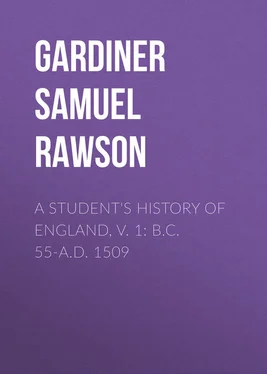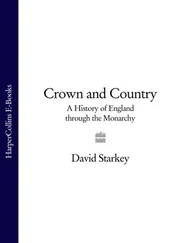Samuel Gardiner - A Student's History of England, v. 1 - B.C. 55-A.D. 1509
Здесь есть возможность читать онлайн «Samuel Gardiner - A Student's History of England, v. 1 - B.C. 55-A.D. 1509» — ознакомительный отрывок электронной книги совершенно бесплатно, а после прочтения отрывка купить полную версию. В некоторых случаях можно слушать аудио, скачать через торрент в формате fb2 и присутствует краткое содержание. Издательство: Иностранный паблик, Жанр: foreign_prose, История, foreign_antique, на английском языке. Описание произведения, (предисловие) а так же отзывы посетителей доступны на портале библиотеки ЛибКат.
- Название:A Student's History of England, v. 1: B.C. 55-A.D. 1509
- Автор:
- Издательство:Иностранный паблик
- Жанр:
- Год:неизвестен
- ISBN:нет данных
- Рейтинг книги:5 / 5. Голосов: 1
-
Избранное:Добавить в избранное
- Отзывы:
-
Ваша оценка:
- 100
- 1
- 2
- 3
- 4
- 5
A Student's History of England, v. 1: B.C. 55-A.D. 1509: краткое содержание, описание и аннотация
Предлагаем к чтению аннотацию, описание, краткое содержание или предисловие (зависит от того, что написал сам автор книги «A Student's History of England, v. 1: B.C. 55-A.D. 1509»). Если вы не нашли необходимую информацию о книге — напишите в комментариях, мы постараемся отыскать её.
A Student's History of England, v. 1: B.C. 55-A.D. 1509 — читать онлайн ознакомительный отрывок
Ниже представлен текст книги, разбитый по страницам. Система сохранения места последней прочитанной страницы, позволяет с удобством читать онлайн бесплатно книгу «A Student's History of England, v. 1: B.C. 55-A.D. 1509», без необходимости каждый раз заново искать на чём Вы остановились. Поставьте закладку, и сможете в любой момент перейти на страницу, на которой закончили чтение.
Интервал:
Закладка:
28. Carausius and Allectus. 288—296.—In 288Carausius, with the help of some pirates, seized on the government of Britain and threw off the authority of the Emperor. He was succeeded by Allectus, yet neither Carausius nor Allectus thought of making himself the head of a British nation. They called themselves Emperors and ruled over Britain alone, merely because they could not get more to rule over.
29. Constantius and Constantine. 296—337.—Allectus was overthrown and slain by Constantius, who, however, did not rule, as Carausius and Allectus had done, by mere right of military superiority. The Emperor Diocletian ( 285—305) discovered that the whole Empire, stretching from the Euphrates to the Atlantic, was too extensive for one man to govern, and he therefore decreed that there should in future be four governors, two principal ones named Emperors ( Augusti ), and two subordinate ones named Cæsars. Constantius was first a Cæsar and afterwards an Emperor. He was set to govern Spain, Gaul, and Britain, but he afterwards became Emperor himself, and for some time established himself at Eboracum ( York ). Upon his death ( 306), his son Constantine, after much fighting, made himself sole Emperor ( 325), overthrowing the system of Diocletian. Yet in one respect he kept up Diocletian's arrangements. He placed Spain, Gaul, and Britain together under a great officer called a Vicar, who received orders from himself and who gave orders to the officers who governed each of the three countries. Under the new system, as under the old, Britain was not treated as an independent country. It had still to look for protection to an officer who lived on the Continent, and was therefore apt to be more interested in Gaul and Spain than he was in Britain.
30. Christianity in Britain.—When the Romans put down the Druids and their bloody sacrifices, they called the old Celtic gods by Roman names, but made no further alteration in religious usages. Gradually, however, Christianity spread amongst the Romans on the Continent, and merchants or soldiers who came from the Continent introduced it into Britain. Scarcely anything is known of its progress in the island. Alban is said to have been martyred at Verulamium, and Julius and Aaron at Isca Silurum. In 314three British bishops attended a council held at Arles in Gaul. Little more than these few facts have been handed down, but there is no doubt that there was a settled Church established in the island. The Emperor Constantine acknowledged Christianity as the religion of the whole Empire. The remains of a church of this period have recently been discovered at Silchester.
31. Weakness of the Empire.—The Roman Empire in the time of Constantine had the appearance rather than the reality of strength. Its taxation was very heavy, and there was no national enthusiasm to lead men to sacrifice themselves in its defence. Roman citizens became more and more unwilling to become soldiers at all, and the Roman armies were now mostly composed of barbarians. At the same time the barbarians outside the Empire were growing stronger, as the tribes often coalesced into wide confederacies for the purpose of attacking the Empire.
32. The Picts and Scots.—The assailants of Britain on the north and the west were the Picts and Scots. The Picts were the same as the Caledonians of the time of Agricola. We do not know why they had ceased to be called Caledonians. The usual derivation of their name from the Latin Pictus , said to have been given them because they painted their bodies, is inaccurate. Opinions differ whether they were Goidels with a strong Iberian strain, or Iberians with a Goidelic admixture. They were probably Iberians, and at all events they were more savage than the Britons had been before they were influenced by Roman civilisation. The Scots, who afterwards settled in what is now known as Scotland, at that time dwelt in Ireland. Whilst the Picts, therefore, assailed the Roman province by land, and strove, not always unsuccessfully, to break through the walls which defended its northern frontier, the Scots crossed the Irish Sea in light boats to plunder and slay before armed assistance could arrive.
33. The Saxons.—The Saxons, who were no less deadly enemies of the Roman government, were as fierce and restless as the Picts and Scots, and were better equipped and better armed. At a later time they established themselves in Britain as conquerors and settlers, and became the founders of the English nation; but at first they were only known as cruel and merciless pirates. In their long flat-bottomed vessels they swooped down upon some undefended part of the coast and carried off not only the property of wealthy Romans, but even men and women to be sold in the slave-market. The provincials who escaped related with peculiar horror how the Saxons were accustomed to torture to death one out of every ten of their captives as a sacrifice to their gods.
34. Origin of the Saxons.—The Saxons were the more dangerous because it was impossible for the Romans to reach them in their homes. They were men of Teutonic race, speaking one of the languages, afterwards known as Low German, which were once spoken in the whole of North Germany. The Saxon pirates were probably drawn from the whole of the sea coast stretching from the north of the peninsula of Jutland to the mouth of the Ems, and if so, there were amongst them Jutes, whose homes were in Jutland itself; Angles, who inhabited Schleswig and Holstein; and Saxons, properly so called, who dwelt about the mouth of the Elbe and further to the west. All these peoples afterwards took part in the conquest of southern Britain, and it is not unlikely that they all shared in the original piratical attacks. Whether this was the case or not, the pirates came from creeks and inlets outside the Roman Empire, whose boundary was the Rhine, and they could therefore only be successfully repressed by a power with a good fleet, able to seek out the aggressors in their own homes and to stop the mischief at its source.
35. The Roman Defence.—The Romans had always been weak at sea, and they were weaker now than they had been in earlier days. They were therefore obliged to content themselves with standing on the defensive. Since the time of Severus, Britain had been divided, for purposes of defence, into Upper and Lower Britain. Though there is no absolute certainty about the matter, it is probable that Upper Britain comprised the hill country of the west and north, and that Lower Britain was the south-eastern part of the island, marked off by a line drawn irregularly from the Humber to the Severn. 1Lower Britain in the early days of the Roman conquest had been in no special need of military protection. In the fourth century it was exposed more than the rest of the island to the attacks of the Saxon pirates. Fortresses were erected between the Wash and Beachy Head at every point at which an inlet of the sea afforded an opening to an invader. The whole of this part of the coast became known as the Saxon Shore, because it was subjected to attacks from the Saxons, and a special officer known as the Count of the Saxon Shore was appointed to take charge of it. An officer known as the Duke of the Britains ( Dux Britanniarum ) commanded the armies of Upper Britain; whilst a third, who was a civilian, and superior in rank over the other two, was the Count of Britain, and had a general supervision of the whole country.
36. End of the Roman Government. 383—410.—In 383Maximus, who was probably the Duke of the Britains, was proclaimed Emperor by his soldiers. If he could have contented himself with defending Britain, it would have mattered little whether he chose to call himself an Emperor or a Duke. Unhappily for the inhabitants of the island, not only did every successful soldier want to be an Emperor, but every Emperor wanted to govern the whole Empire. Maximus, therefore, instead of remaining in Britain, carried a great part of his army across the sea to attempt a conquest of Gaul and Spain. Neither he nor his soldiers ever returned, and in consequence the Roman garrison in the island was deplorably weakened. Early in the fifth century an irruption of barbarians gave full employment to the army which defended Gaul, so that it was impossible to replace the forces which had followed Maximus by fresh troops from the Continent. The Roman Empire was in fact breaking up. The defence of Britain was left to the soldiers who remained in the island, and in 409they proclaimed a certain Constantine Emperor. Constantine, like Maximus, carried his soldiers across the Channel in pursuit of a wider empire than he could find in Britain. He was himself murdered, and his soldiers, like those of Maximus, did not return. In 410the Britons implored the Emperor Honorius to send them help. Honorius had enough to do to ward off the attacks of barbarians nearer Rome, and announced to the Britons that they must provide for their own defence. From this time Britain ceased to form part of the Roman Empire.
Читать дальшеИнтервал:
Закладка:
Похожие книги на «A Student's History of England, v. 1: B.C. 55-A.D. 1509»
Представляем Вашему вниманию похожие книги на «A Student's History of England, v. 1: B.C. 55-A.D. 1509» списком для выбора. Мы отобрали схожую по названию и смыслу литературу в надежде предоставить читателям больше вариантов отыскать новые, интересные, ещё непрочитанные произведения.
Обсуждение, отзывы о книге «A Student's History of England, v. 1: B.C. 55-A.D. 1509» и просто собственные мнения читателей. Оставьте ваши комментарии, напишите, что Вы думаете о произведении, его смысле или главных героях. Укажите что конкретно понравилось, а что нет, и почему Вы так считаете.












